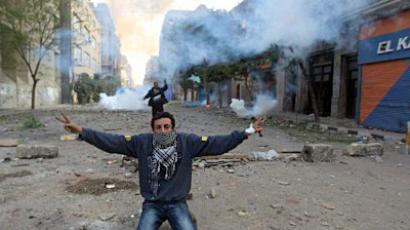New Libya: Guns to go silent but future elusive
Libya’s new government has vowed to free the capital of armed militias and ensure civilians also hand over personal weapons by the end of the month. The move is both welcome and necessary – but will it bring stability to once-secure Tripoli?
After months of waking up to gunfire, residents of Tripoli now have to get used to a new alarm tone. The city of two million people has an extensive rooster population and the birds have all but replaced rifle chatter, heralding the new dawn.“There is no exchange of gunfire, the situation is OK,”one Tripoli resident told RT. While the revolutionary rush has spared barely a wall in Tripoli, people there are clearly fatigued by eight months of civil war.The Libyan capital has been flooded with former rebels ever since they stormed in to evict Colonel Gaddafi in August. Now they have until December 20 to leave, and the Tripoli brigade itself will dissolve at the end of the month, reports the Associated Press."All individuals must give up their weapons and go back to civilian life or sign up with security forces with the ministries of defense or interior," the agency quotes Abdel-Rafik Bu Hajjar, head of Tripoli's city council, as saying at a news conference on Tuesday.The uncontrolled ownership of weapons has been a major security concern since the end of the eight-month civil war, and bringing the situation under control has been a central demand of residents. But as RT’s Oksana Boyko reports from Tripoli, the population, which was once entitled to a range of social benefits, has doubts about the new government’s ability to usher in a brighter future. This may be the new, liberated Libya, yet very few want it to break free from the obligations of the old regime.On the surface, it seems that the normal flow of life in Tripoli has been restored, says Oksana Boyko. The city where many homes did not have access to basic sanitation less than two months ago already has its fountains up and running. But the new Libya is still facing the danger of running aground in the shallow waters of international politics. Much of its assets remain frozen, limiting the new government's ability to pay subsidies and salaries – a situation which has already put a major damper on the revolutionary spirit.RT’s crew first met Muhhammad Tourki in August on the front lines of Bani Walid, one of the final strongholds of the Gaddafi regime. A former engineering student, he joined two of his older brothers in what he says was a win or die fight for freedom.“At the beginning, everything was absolutely peaceful. There were no guns, we wanted freedom and fairness,”he told RT. “But then the dictator used gunfire against us and we lost many young rebels.” Three months later, Muhhammad is definitely in the driver's seat. Rebels are the country's new heroes, popular with women and the public at large. If not for the rifle by his side, Muhhammad would be like a 27-year-old in any other country, cruising around on a Saturday night. “Life is good,”he confessed to RT. And it is not as if he was underprivileged under the Gaddafi regime. His family lives in a 300-square-meter house in a prestigious area of Tripoli. They say the revolution has brought them long-awaited democracy but has yet to translate into concrete benefits.“We had free education and healthcare under Gaddafi. Of course, we expect it to remain free, but it also needs to be improved. The new authorities also have to decrease prices and raise salaries so that ordinary people can enjoy all the benefits of the revolution,”he says. Yet exactly how the new government can afford to do so in a country ruined by war and stripped of much of its budgetary income is anyone’s guess. The 42 years of Gaddafi's rule taught Libyans to rely on the government for just about everything, and the level of expectations on the new authorities is very high.“I have big plans for my life. In a year or so, God willing, I want to finish my education, get a good job and save enough money to marry. It's all become possible for us now,”Muhhammad believes. However, international economists are not so upbeat.“I think the fact that they were willing to de-stabilize a regime that had one of the highest living standards in North Africa goes to show the fact that they were not so interested in what benefits people as a whole had in the first place,” James Corbett, editor of the Corbettreport.com website, told RT. “They were more interested in forming their economic ties to American oil companies.”If what Libyans wanted was the same or a better life than they had under Gaddafi, they look set to be disappointed. Yet for the moment, the future seems bright – not least because it is also very blurred.














